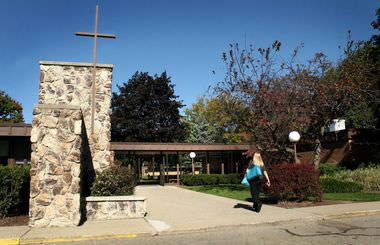 As you’re considering your choices in higher education, you may be wondering what degrees are offered at a Bible College. It may be helpful to first think through the differences in college options, as different types of colleges provide different kinds of educational and vocational focuses.
As you’re considering your choices in higher education, you may be wondering what degrees are offered at a Bible College. It may be helpful to first think through the differences in college options, as different types of colleges provide different kinds of educational and vocational focuses.
Christian College or Bible College?
If you’re a Christian, you may be contemplating attending a school with a spiritual focus. A Christian college and a Bible college can both provide that, but in slightly different ways. The term “Christian college” generally refers to a liberal arts school that has a distinctively Christian ethos. General subjects are taught by Christian faculty with reference to a Christian worldview. Biblical studies are usually offered, but as part of a much larger canvas of possible degrees and subject areas. A Bible college, on the other hand, is more specifically narrow in its focus of classes and degrees. Students who want to go into full-time Christian ministry, generally as pastors or missionaries, are the ones who would be best served by attendance at a Bible college.
Bible College Degrees
As you can see from the name itself, Bible colleges generally focus their curriculum on the Bible. Learning to read and wisely interpret the Christian scriptures becomes the crux of your studies. This means that even if you take classes in other disciplines, you will likely find those studies relating back in some way to your study of the Bible.
So Bible colleges offer degrees specifically in Biblical Studies. This may be a Bachelor’s degree, an Associate’s degree, or a certificate. In addition to degrees specifically in Biblical studies, many Bible colleges offer other degrees to prepare students for practical, specific types of Christian ministry in church, parachruch or missions field settings. These may include degrees in pastoral or family counseling, family and children’s ministry, spiritual formation and discipleship, social work, education (for a church or school setting), music ministry, music performance, music education and other worship arts. Teaching English as a Second Language, preparation for ministries that work specifically with women, and pre-seminary track studies are further possibilities you’ll find in Bible colleges. Some Bible colleges are affiliated with seminaries where you can go on and receive a master’s degree once you’ve completed your undergraduate studies.
Choosing the Right Place for You
Discernment is an important part of any college choice, but it may be particularly important when choosing a Bible college. Bible colleges are often affiliated with certain Christian traditions or denominations, and since you are preparing for practical training for Christian ministry, you may want to put clear thought into which specific tradition you plan to work within so you can receive training that is in line with that distinctive tradition. But doctrinal and traditional emphases aside, Bible colleges tend to work from a similar framework. As the Association for Biblical Education puts it, its affiliated colleges all strive to have students read the Bible “in a posture of discipleship.” If that’s a posture you can embrace, and if you want to pursue practical Christian ministry, then asking what degrees are offered at a Bible college may be your next step.
Related Resources: